We crossed the border of Romania with one aim in the mind: to leave the bikes and head back to Poland. Our friends' wedding was coming up, and we wanted very much to be there. The landing ground had been prepared before, by asking people at Couch Surfing to keep our bikes.
We entered Sighetu Marmaţiei late in the night, without much chance of contacting anyone, so headed straight to a hostel. A night in a soft bed can be very nice experience, if it does happen only occasionally.
The following day we met Sonia from CS, together with her friends. They live in Sighetu and it's surroundings, and are students of the first years of university. An interesting and quite sad thing is that young people complain much about Romania, and they wish to go abroad as soon as possible. This is especially surprising for someone, who has just crossed from Ukraine and has noticed the difference of development on both sides of the border.
For the night Sonia took us to her parent's house, located in the hills surrounding the city of Sighetu. I would never believe, that on the first evening in that rural province of Romania I would swim in a garden pool with a view of the mountains.
After a breakfast with parents, we headed to the village museum of Maramureş. For anyone at least a bit interested in local cultures, that place would be interesting. Each of the numerous nations living in the region has a house on display, usually equipped with traditional tools and handicraft.
Quick repacking, coffee, and we walked back to the border, and then to the train station. Although the distance was not long, we had the same impression at the end: walking is boring. If there is a chance to cycle, just do it. The scorching sun did not make it easier, as well as it contributed to a smelly interior of the crowded train.
With the temperature falling in the evening, the train became more lively. People started talking to each other, eating, drinking few shots of vodka. Too bad, we could not enjoy more sophisticated conversations. But as the train was approaching it's destination, Lviv, we could hear the huge difference between Ukrainian from there and the Transcarpathian dialect, which we were listening to for the last two weeks. Surprisingly, the latter was much easier to understand for us.
The overnight train costed us about 2 EUR per person. That made me think, I would go again to Ukraine, travelling with trains only. However old, they are comfortable and punctual. Such opportunity cannot be missed. All the way there to Warsaw was quick and cheap. About 27 hours with a total cost of 5 EUR seems to be kind of a record. It included the train, three buses and a long hitchhiking ride.
The next days we spent with our friends, preparing, celebrating and cleaning up their wedding. That was a wonderful, happy time. We made friends with the bride's family and enjoyed staying at their tranquil house in the woods. Also, I used this visit to see my family and arrange few important things. Replaced the stolen camera, picked up some spare parts, and with a great help of the people working at the Syrian consulate, I managed to get a visa on the next day. The visit at the capital, however, made me realize that I could be unable to get back to the rush and noise of a big city, after having finished this journey. Three months away and the city felt unbearably hectic for me. What would happen after almost two years?
Well fed, equipped, we headed back to continue the journey. This time we learned another important thing about the Ukrainian trains: even if there are no tickets left, one should ask at the train. The car's crew (provadnik) would gladly sell his bed to you. It costs about fivefold the price of the regular ticket, but is still cheaper than anywhere in the west.
As sad it was to say goodbye to our friends, as happy it was to say hello to our bikes. We took them from Sonia's house, and headed to Săpânţa. The Merry Cemetery there, is perhaps the biggest highlight of a visit in Maramureş. It is the only place where I noticed such humorous approach to the death. Each of the graves is decorated with a picture or two, of a person who lays there. Usually they are depicted in situations reflecting their job or lifestyle, and sometimes the moment of death. Each of the boards has also a poem, which — as we were told — is usually an anecdote about the person. Never before I wished so much to know Romanian language. The beauty of the cemetery and wooden churches, for which the region is known, is just a flower on the top of the entire beautiful base. The wooden houses with their decorated gates, the folk costumes, the noisy weddings we witnessed, all they make up for a picture of an unique place on Earth. It seems that people of Maramureş have had some special sensitivity and feel of beauty. Like anywhere in the world, this region falls victim to globalisation, to standard concrete houses and typical Chinese-made clothes. The wooden houses are being sold and carried away, usually abroad, where they lose much of their value, after being taken out of their context. However, Maramureş still displays clearly it's uniqueness and beauty.
For the night we again used our recent technique: ask for a place for the tent. This time we entered a property of a middle-aged man, who has already been hosting his cousin with two children. The alternative between the tent and a haystack met with the clear choice of the latter. Meanwhile, the supper was ready, and we had already done the first shot of pálinka. Our host spent 7 years in Spain, so I was glad to be able to refresh my knowledge of Spanish and communicate with him. The entire house has been a result of his hard work and hard currency brought from abroad. With the recent crisis, he lost his work, but gained a right to get social help from Spain. That money allowed him to live freely in Romania, at least for some time.
The road to the east of Maramureş led us through picturesque villages. We enjoyed fresh fruits, both from trees and market stalls, while hiding from the sun under trees. The heat of the day was balanced somehow by the chill of the nights. This, and the absence of mosquitoes, were clear signs of the altitude we had reached.
Maramureş is well known among Poles. Every day we met someone speaking our language, and once we even met a van with Polish flag. Two couples with two children were travelling there. They showed us a way to a nice camping place, where we spent the evening together. It was not the first time for them to visit Maramureş, and they did not even plan to leave the region during their two week stay there. It did not seem strange to me. Maramureş is extraordinary and fascinating place.

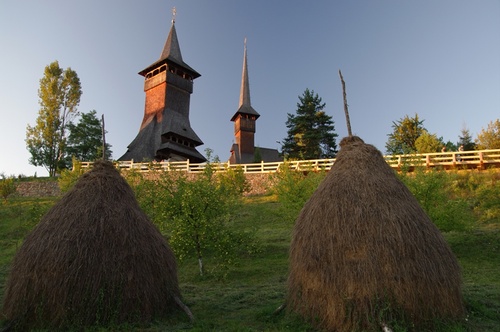
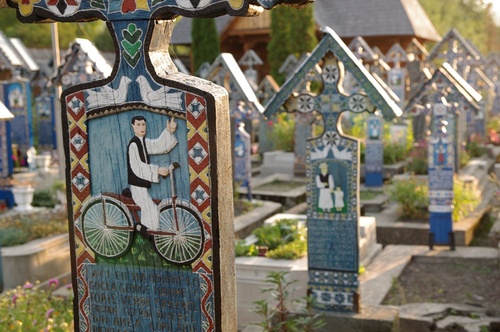
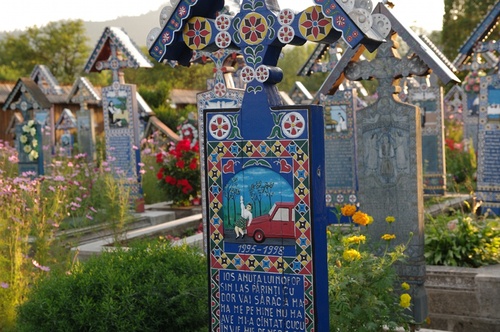
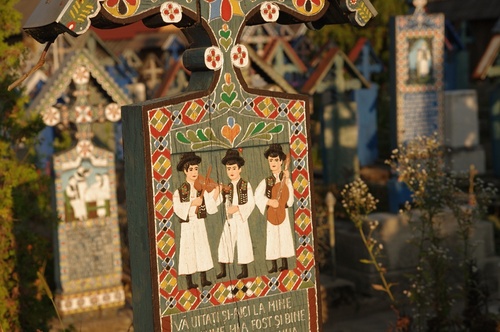
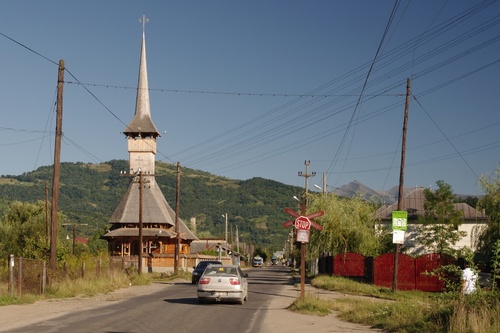
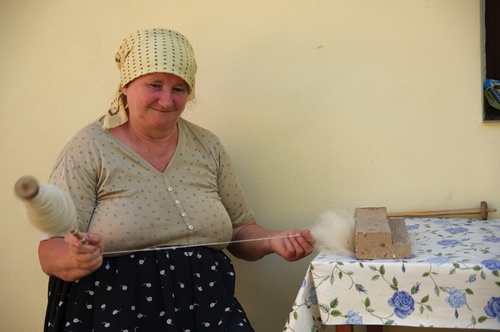
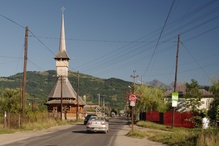
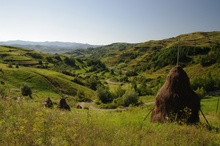
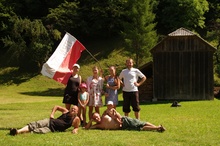
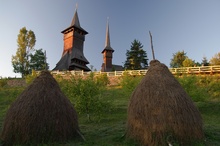


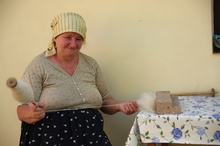
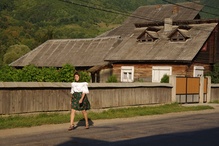
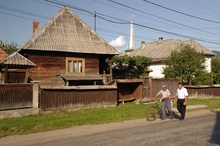
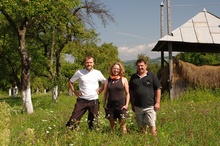
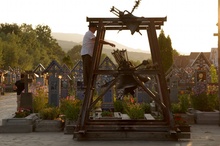
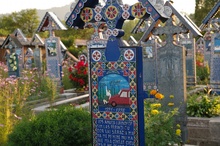
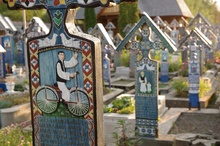

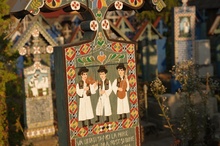
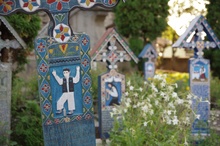
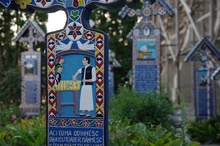

Comments:
hdk
Marta
pigiel
Bee